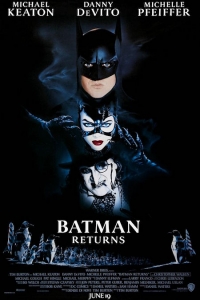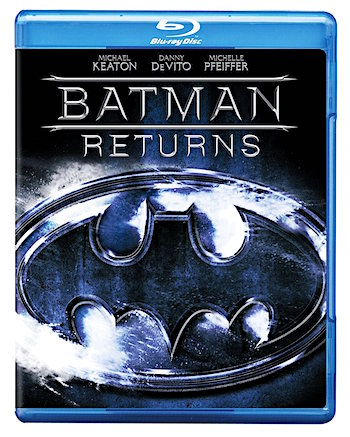Coate: In what way is Batman Returns significant as a sequel?
Bond: Again, it was the way Warner Bros. empowered Tim Burton just to make the movie he wanted and not worry about how this was serving the franchise or setting up other movies (in fact there was talk of moving forward with more Keaton/Burton Batman movies but eventually you had Joel Schumacher, who was like the opposite of Tim Burton, take over). It set the precedent for giving these franchise films to up and coming, creative directors to see what kind of energy they’d bring to it — but no one has ever brought the kind of personal vision to a comic book film that Burton did.
Mendelson: Batman Returns sticks out today as a sequel that is both a part of its franchise (it acknowledges the events of Batman) and utterly its own separate thing. It is not remotely concerned with the next sequel nor any kind of world-building beyond the story being told in its 126-minute running time. It was also notable in terms of a sequel being a full-on work of auteurism as opposed to a more “half studio/half filmmaker” original franchise starter. Think Transformers 2, Batman & Robin, The Dark Knight and Spider-Man 2.
Scivally: The initial Superman film showed that a comic book movie could be made like an “A” list film and draw an adult audience; the first Batman film showed that the public would buy a version of Batman that was darker than the Adam West TV version. The second film proved that the success of the first Batman film was repeatable, establishing it as a viable franchise.
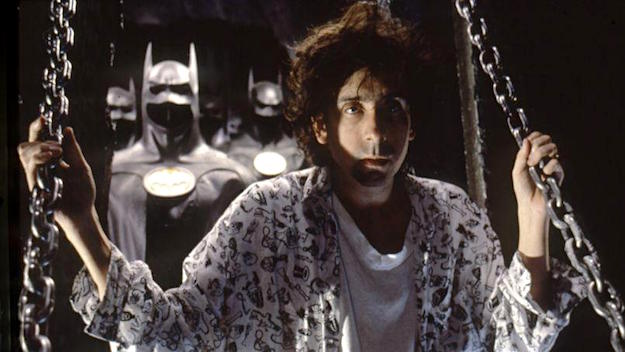
Coate: Where do you think Batman Returns ranks among director Tim Burton’s body of work?
Bond: It was confirmation that Burton could do blockbusters, make them his way, and have them be huge hits. He’s probably the strangest director that Hollywood has ever consistently given millions of dollars to make movies and given him almost absolute freedom to do so, and I think that’s wonderful. After years of Tim Burton movies you do get people making fun of their conventions but there is no one else who makes movies like him — he is a genre unto himself and that’s nothing to be ashamed of.
Mendelson: I think it’s Tim Burton’s second best movie behind Ed Wood. It’s a deeply personal work inside a comic book superhero sequel and I think its “controversy” broke him for a while. But it just took a while for the kids who grew up on Beetlejuice and Pee-wee to grow up to be adults and the new generation of film critics/media for him to get his due as more than just a great art director.
Scivally: I can’t answer this question in good faith, because I have not seen all of Tim Burton’s films. I wouldn’t rank it among his best works (that honor goes to Edward Scissorhands, Ed Wood and Big Eyes), but it’s not among his worst, either. It’s middling. It definitely has the unique look of a Burton film, existing in a studio-bound universe all its own (it’s an odd world: a mostly black, decrepit Gotham, overrun with giant-sized Fascist statuary, angled rooftops with an abundance of smoke-belching exhaust pipes, and people running about dressed like it’s the 1940s instead of the 1990s; production designer Bo Welch conceived it as a city that was “huge, dehumanizing and falling in on itself”), it moves at a good pace and has fine performances, and is more tightly-plotted than the rather sloppy Batman film that preceded it, but for me it’s undone by having the Penguin be Shreck’s stooge rather than a criminal mastermind in his own right, and Batman not really having much to do.
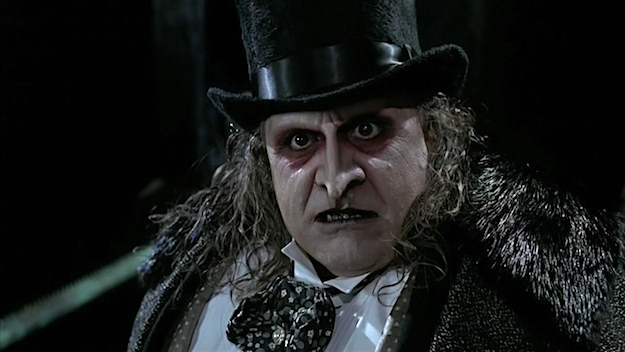
Coate: How effective or memorable a villain was Danny DeVito’s The Penguin?
Bond: To my thinking DeVito’s performance, and the way it was guided by Burton, is the biggest miscalculation in the movie, because he is so unpleasant, creepy and scary that his scenes kind of suck the fun out of the movie. Contrast that with Christopher Walken’s scenes, which are arguably the most fun parts of the movie. Walken manages to be an unpredictable, effective villain, but he’s also hilarious, and this is a movie with attacking penguins, so you’d think it would be a little more fun. But the other side of the coin is that it’s part of the journey toward the darker superhero movies of today like The Dark Knight or even Logan. People forget that the only previous comic book movies were the Superman films, which were bright and funny and charming, and no one had seen a blockbuster comic book movie that was dark and gothic before. So maybe you couldn’t have Heath Ledger’s Joker without Danny DeVito’s Penguin.
Mendelson: It’s a terrific piece of movie star acting, utterly fearless and yet oddly sympathetic. He relishes creating a three-dimensional baddie that actually acts like an adult (sexual kinks and all).
Scivally: DeVito’s Penguin is a truly horrible and disgusting creature, with his white face, beak nose, claw hands, black eyes, sharp grey teeth, and scraggly hair. And in almost every scene there’s something drooling over his chin — raw fish, blood, black bile. But he’s not the real villain of the piece. That honor goes to Max Shreck, played by Christopher Walken. Max (the second time Walken played a villain named Max in a major franchise, after being Max Zorin in 1985’s 007 film A View to a Kill) is a wealthy businessman with political influence whose public beneficence hides sinister intentions. The Penguin, meanwhile, is an attention-starved, lecherous walking id longing to be accepted and praised. The idea that anyone like Shreck, or the Penguin, could ever fool the public enough to attain high political office is absurd. Right?
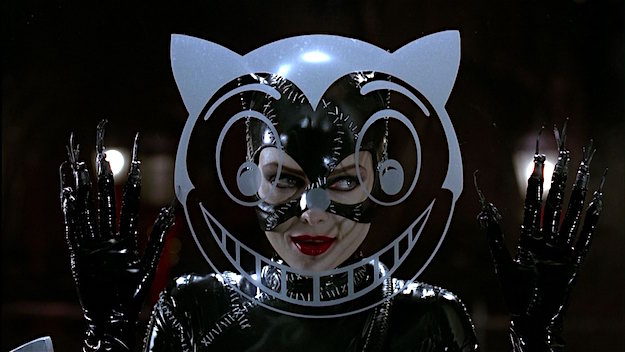
Coate: How effective or memorable a villain was Michelle Pfeiffer’s Catwoman?
Bond: You can make a pretty good argument that Pfeiffer’s Catwoman was the best ever done — her introduction is a bravura sequence and her chemistry with Michael Keaton is electrifying and outrageously ups the ante on the old Adam West/Julie Newmar interaction from the 1966 show, which was groundbreaking on its own. The Pfeiffer Catwoman I think was a pivotal piece of proto-feminism in showing her origin as really a reaction to the sexist, condescending treatment of Christopher Walken’s character, so she becomes less a villain than an antihero who’s out there kicking ass for women all over, and even taking her rage out on another woman who she sees as acting too much the victim during a wave of street crime. Between Burton’s staging, the cinematography and her costume design, she might be the first convincing female comic book superhero character in the movies.
Mendelson: I’m not going to say she should have won the Oscar that year, because I’m a big Marisa Tomei fan, but Pfeiffer should darn well have at least been nominated for her richly introspective bit of villainy. It’s not only a wonderful melodramatic performance but a sharp bit of ahead-of-its-time satire that pokes brutal fun at the now in-vogue “strong female character” trope.
Scivally: Michelle Pfeiffer was an outstanding Catwoman. Like Penguin, she was — at least while clad in black leather — a walking id, while her Selina Kyle persona developed from being mousy at the beginning to more bold by the end, as her Catwoman-self allowed her to claim and embrace her inner feminine power. She’s just as schizophrenic and mentally unbalanced as Bruce Wayne/Batman. And the actress (a last-minute replacement for Annette Bening, who became pregnant prior to the commencement of filming) certainly committed herself to her role — the bird that flies out of her mouth was done for real, not with special effects.
Coate: What is the legacy of Batman Returns?
Bond: Both Burton’s Batman films are pivotal both to lay the foundations for the serious, psychologically complex superhero movies we see today, and as the illustration of Tim Burton as an utterly unique artist who was given the reigns to Warner Bros.’ and DC’s priceless comic book superheroes.
Mendelson: As I wrote back in September: This gorgeous, haunting and unexpectedly moving comic book superhero sequel was an arthouse horror story using the protection of the most famous “branded” material in the world. It somewhat backfired on audiences and critics, who didn’t care for gore and sexuality in their kid-targeted superhero story. But the film stands tall today as an uncommonly personal and challenging blockbuster…. Part “faithful” adaptation of the late-80s/early-90s Batman comics, part “Batman as a fairy tale,” this deliciously macabre action comedy is still one of the all-time great comic book adaptations. It also operates as a metaphor for the main character, with each of the three villains (Danny De Vito’s bitter abandoned orphan, Michelle Pfeiffer’s righteously crazed murderous vigilante and Christopher Walken’s heartlessly evil corporate tycoon) represented a “what-if” worst case scenario path that our hero could have taken…. And yeah, I loved it in 1992, was befuddled by the reception (I always found Batman to be far more violent) and was saddened when it led to the de-fanging of the PG-13 for a while. But it’s still one of the great comic book superhero movies of all time and stands alongside Mission: Impossible and Terminator 2 as one of the big “really for adults” tentpole blockbusters of the mid-1990s.
Scivally: The film is more tightly scripted than its predecessor, with a theme of rejection and acceptance; it begins with the ultimate rejection, as the Cobblepots throw their deformed baby into a river, and continues with Penguin’s desire for acceptance leading him to run for Mayor. In addition, there’s Selena Kyle, a wallflower who appears to have been rejected by men all her life, culminating with her boss, Max Shreck, pushing her out of a high window (an extreme rejection), and being reborn as the overtly sexual Catwoman. And Batman faces rejection from the citizens of Gotham when the Penguin makes it look as though he’s killed the city’s Ice Princess and run down its citizens in a Penguin-controlled Batmobile — and ultimately, he’s rejected by Selina Kyle/Catwoman. Batman Returns isn’t so much a superhero film as it is a dreamlike vision — or nightmare vision — of a city where the sun never shines, and the superheroes and supervillains are deeply psychologically scarred outsiders looking for their place in a society that rejects them, a theme that Burton often revisits in his best films. It is chock-full of the kind of bizarrely outré imagery typical of Burton’s imagination, but that imagination tends to bend in a morbid direction, which is what ultimately spelled the end of Burton’s reign as Batman director — kids whose parents took them to the film because it was promoted with McDonald’s Happy Meals were frightened by its dark themes, so Warner Bros. quietly pushed Burton aside and brought in a director who would be more willing to play ball with the studio and make the films more kid-friendly, leading to the neon, hyper-kinetic Batman films of Joel Schumacher.
Coate: Thank you — Jeff, Scott and Bruce — for sharing your thoughts on Batman Returns on the occasion of the 25th anniversary of its release.
--END--
IMAGES
Selected images copyright/courtesy Warner Bros., Warner Home Video.
SOURCES/REFERENCES
The primary references for this project were regional newspaper coverage and trade reports published in Boxoffice, The Hollywood Reporter, Variety and Widescreen Review. All figures and data included in this article pertain to the United States and Canada except where stated otherwise.
SPECIAL THANKS
Don Beelik, Kathryn Devine, Bobby Henderson, Brad Miller, and to the San Francisco Public Library and Washington State Library.
IN MEMORIAM
Bob Kane (Batman creator), 1915-1998
Stuart Lancaster (“Penguin’s Doctor”), 1920-2000
Rick Zumwalt (“Tattooed Strongman”), 1951-2003
Vincent Schiavelli (“Organ Grinder”), 1948-2005
Pat Hingle (“Commissioner Gordon”), 1924-2009
Michael Gough (“Alfred”), 1916-2011
Marion Dougherty (Casting), 1923-2011
Jan Hooks (“Jen”), 1957-2014
-Michael Coate
Michael Coate can be reached via e-mail through this link. (You can also follow Michael on social media at these links: Twitter and Facebook)

